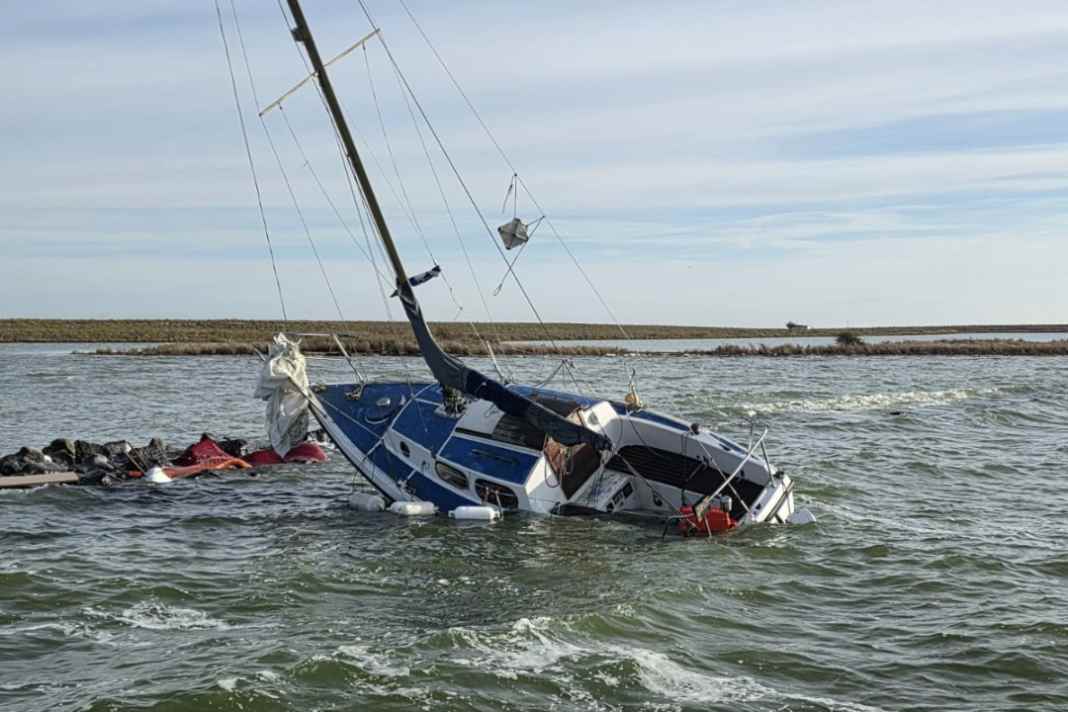Robinson on Halloween: German sailor survives 60 hours on uninhabited island
Ursula Meer
· 05.11.2025




A small, quiet boat trip on Halloween (31 October 2025) turned into an unplanned adventure for a German sailor. He had to spend more than two days alone on the artificially created and uninhabited island of De Kreupel in the IJsselmeer after his sailing boat ran aground on a groyne and partially sank. Rescue workers from the Koninklijke Nederlandse Redding Maatschappij (KNRM) in Andijk rescued the man on Sunday after more than 60 hours in which he had to survive without functioning means of communication, food or fresh water. The recreational sailor had used parts of his boat to build a makeshift shelter out of canvas to protect himself from the wind and weather.
Fortunately for him, the crew of a sailing boat that happened to be passing by spotted the casualty and alerted the coastguard. The sailor got off lightly - after the end of the season, it was more of a coincidence that he was discovered.
Unfortunate chain of circumstances - and a lack of preparation
The German leisure sailor had already anchored off the bird sanctuary island on Friday. During the night, however, strong winds tugged at the hook. According to KNRM, the engine was malfunctioning and there was not enough fuel on board. The boat drifted inexorably and ran aground on a groyne off the uninhabited island. As the KNRM reported on Facebook, the man lost all contact with the outside world: his mobile phone battery was flat and he had neither a radio nor emergency signals on board. With no means of calling for help, he was left behind on the uninhabited island. The boat was so badly damaged in the collision with the large boulders that it sprung a leak. The sailor tried to pump out the water, but it was too much. He eventually left the boat and waded through the shallow water to the island.
Two nights under canvas
The shipwrecked man had to wait out two nights on the deserted island in falling temperatures and strong gusts of wind, with the mainland just two and a half nautical miles away and yet out of reach. Without access to drinking water, food or emergency equipment, his situation became increasingly critical. He was only able to salvage a few supplies from his boat; in the two and a half days he barely had anything to eat or drink. He built a makeshift tent from the sails of his boat, which at least offered him some protection from the weather. Rescue workers found the exhausted man in this makeshift shelter in wet clothes and in a slightly confused state. He had occasionally thought he would lose his life there, he told them. As the sailing season was already over and there were almost no boats on the IJsselmeer, his misfortune initially went unnoticed. It was only on Sunday morning that the crew of a passing sailing boat discovered the wreck and alerted the Dutch coastguard.
Unusual rescue operation
As the Dutch newspaper "De Telegraaf" reported, citing the skipper of the KNRM Andijk, the rescue team arrived at the half-sunken boat together with colleagues from Medemblik at around midday. The rescuers also found the man on the island and brought him safely on board their lifeboat. After the rescue, they transported him to the marina in Andijk, where he was given warm clothes, a meal and a shower. He was then accommodated in a hotel to recover.
This operation was also very unusual for the rescuers. The skipper of the lifeboat told "De Telegraaf": "In twenty years with the >KNRM, I have never experienced anything like this." The IJsselmeer is large and calm, and in late autumn there are only a few boats on the water. The man was all the happier when he was finally rescued.
Rescuers warn against naivety
The KNRM used the incident to issue an urgent warning about the lack of safety equipment. In its report, the rescue organisation points out that the lack of a functioning radio system, emergency flares or a charged mobile phone battery can have fatal consequences. "This adventure had a happy ending, but it could have turned out differently," emphasised the KNRM in its report. The organisation advises water sports enthusiasts to only set sail with functioning means of communication - a charged mobile phone and a marine radio system as well as emergency signals. In addition, sailors should always check the weather forecast and inform others when they go out on the water. The Dutch authority Rijkswaterstaat was called in to salvage the sunken boat.

